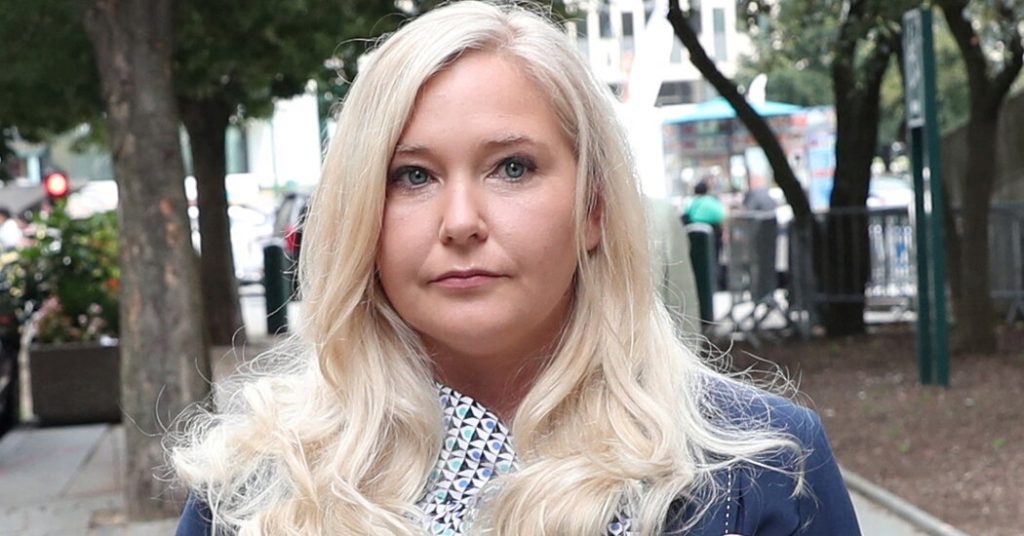Virginia Giuffre, quien fuera víctima de la red de trata con fines sexuales de Jeffrey Epstein, y dijo que cuando era adolescente la “pasaban como un plato de fruta” a ricos y poderosos depredadores, entre ellos el príncipe Andrés del Reino Unido, murió el viernes en su granja de Australia Occidental. Tenía 41 años.
Giuffre murió por suicidio, según una declaración de la familia. Giuffre escribió en una publicación de Instagram en marzo que estaba a días de morir de insuficiencia renal tras resultar herida en un accidente de tráfico con un autobús escolar que, según dijo, circulaba a 110 kilómetros por hora.
En el comunicado, su familia la llamó “una feroz guerrera en la lucha contra los abusos sexuales y el tráfico sexual” y “la luz que levantó a tantas sobrevivientes”.
En 2019, Epstein fue detenido y acusado por la fiscalía federal del Distrito Sur de Nueva York de tráfico sexual y conspiración, acusado de solicitar a chicas adolescentes la realización de masajes que cada vez eran de naturaleza más sexual.
Apenas un mes después de ser detenido, y un día después de que se hicieran públicos los documentos de la exitosa demanda por difamación presentada contra él por Giuffre, Epstein apareció ahorcado en su celda del Centro Correccional Metropolitano del Bajo Manhattan. Su muerte, a los 66 años, fue declarada suicidio.
En 2009, Giuffre, identificada entonces solo como Jane Doe 102, demandó a Epstein, acusándolo a él y a Ghislaine Maxwell, su cómplice e hija del magnate de los medios de comunicación británico caído en desgracia Robert Maxwell, de reclutarla para unirse a su red de tráfico sexual cuando era menor de edad con el pretexto de convertirse en masajista profesional.

Giuffre en 2023 con una foto suya de adolescente. Dijo que fue reclutada para la red de tráfico sexual de Epstein cuando era menor de edad y que “la pasaban como un plato de fruta” entre sus poderosos amigos.Credit…Emily Michot/Miami Herald, vía Tribune News Service, vía Getty Images
En 2015, fue la primera de las víctimas de Epstein en abandonar el anonimato y hacerlo público, vendiendo su historia al tabloide británico The Mail on Sunday.
“Básicamente, me entrenaban para ser prostituta para él y sus amigos, quienes compartían su interés por las chicas jóvenes”, afirmó Giuffre en Virginia Giuffre: The Extraordinary Life Story of the Masseuse Who Pursued and Ended the Sex Crimes of Millionaires Ghislaine Maxwell and Jeffrey Epstein, libro de Nigel Cawthorne publicado 2022.
“Ghislaine me dijo que tengo que hacer por Andrés lo que hago por Jeffrey”, dijo.
Giuffre acusó a Epstein, financiero multimillonario, y a Maxwell, socialité británica, de obligarla a mantener relaciones sexuales con el príncipe Andrés, también conocido como el duque de York. Él negó rotundamente las acusaciones, pero renunció a sus funciones reales en 2019.
En 2021, demandó al príncipe, quien es el hermano menor del rey Carlos III de Inglaterra, alegando que la había agredido sexualmente en la casa de Maxwell en Londres y en las casas de Epstein en Manhattan y Little St. James, en las Islas Vírgenes.
Una fotografía ampliamente difundida mostraba al príncipe Andrés con la mano alrededor de su cintura. Él dijo que no recordaba la ocasión.
Después de que el príncipe Andrés aceptara llegar a un acuerdo sobre la demanda de Giuffre en 2022, la elogió en una declaración por haber hablado y se comprometió a “demostrar su arrepentimiento” por su asociación con Epstein “apoyando la lucha contra los males del tráfico sexual y apoyando a sus víctimas”.
El acuerdo incluía el pago de una suma no revelada a ella y a su organización benéfica, ahora llamada Speak Out, Act, Reclaim.

Una fotografía ampliamente difundida mostraba al príncipe Andrés con la mano alrededor de la cintura de Giuffre; él dijo que no recordaba la ocasión.Credit…Agence France-Presse, vía Tribunal de Distrito de EE. UU. – Distrito Sur.
En entrevistas y declaraciones, Giuffre dijo que fue reclutada para la red sexual en 2000 cuando trabajaba como encargada de vestuarios en el complejo Mar-a-Lago del presidente Donald Trump en Palm Beach, Florida. Según su relato, estaba leyendo un manual de masajes terapéuticos cuando Maxwell se acercó a ella y la invitó a convertirse en masajista itinerante de Epstein. Dijo que ambos la prepararon para prestar servicios sexuales a hombres ricos.
Giuffre demandó a Maxwell por difamación en 2015; llegaron a un acuerdo por una suma no revelada en 2017. Maxwell fue condenada en 2021 por tráfico sexual y otros cargos. El veredicto se consideró el ajuste de cuentas legal que Epstein había negado al sistema judicial, y a sus víctimas, al ahorcarse. Maxwell fue condenada a 20 años de prisión.
Virginia Louise Roberts nació el 9 de agosto de 1983 en Sacramento, hija de Sky y Lynn Roberts. Cuando tenía 4 años, la familia se trasladó al condado de Palm Beach, donde su padre era jefe de mantenimiento en Mar-a-Lago.

Giuffre en una foto sin fecha publicada en 2021, el año en que demandó al príncipe Andrés, acusándolo de agresión sexual.Credit…Agence France-Presse, vía Us District Court – Southern District
Dijo que se escapó de casa tras haber sufrido abusos sexuales por parte de un amigo íntimo de la familia desde que tenía 7 años. Estuvo en hogares de acogida, se alojó con una tía en California, huyó al antiguo refugio hippie del barrio de Haight-Ashbury de San Francisco, vivió en la calle cuando tenía 14 años y pasó seis meses con un traficante sexual de 65 años, quien abusó de ella.
En comparación con vivir en la calle y ganar 9 dólares la hora por su trabajo de verano en Mar-a-Lago, la oferta de Epstein de ganar 200 dólares por un masaje varias veces al día era, según escribió Cawthorne, algo que “Virginia había determinado por sí misma que no podía rechazar”.
Pero su mandato iba mucho más allá de esas obligaciones. En 2019 declaró a la BBC que “los amigos de Epstein la pasaban de mano en mano como si fuera un plato de fruta” y la transportaban por todo el mundo en aviones privados.
En 2002, cuando tenía 19 años, Giuffre se matriculó en la Escuela Internacional de Masaje de Tailandia para convertirse en masajista profesional. Allí conoció a Robert Giuffre, instructor australiano de artes marciales, y se casaron.
La pareja tuvo tres hijos, Christian, Noah y Emily, y vivió en Australia, Florida y Colorado antes de establecerse en Perth en 2020. Desde entonces se separaron. No se dispuso inmediatamente de información sobre quienes la sobreviven.
Giuffre declaró a The Miami Herald en 2019 que el nacimiento de su hija en 2010 la impulsó a hablar públicamente sobre su victimización. Explicó por qué había aceptado en un principio que Epstein y Maxwell la prepararan como masajista y para prestar servicios sexuales.
“Parecían buena gente”, dijo, “así que confié en ellos y les conté que mi vida había sido muy dura hasta entonces: había huido de casa, había sufrido abusos sexuales y físicos. Eso fue lo peor que pude decirles, porque ahora sabían lo vulnerable que era”.
Si tienes pensamientos suicidas, llama o envía un mensaje de texto al 988 para ponerte en contacto con el 988 Suicide and Crisis Lifeline.
O visita SpeakingOfSuicide.com/resources para consultar una lista de recursos adicionales.
Hank Sanders colaboró con reportería.
Sam Roberts es reportero de obituarios para el Times, y escribe minibiografías sobre la vida de personas notables.












